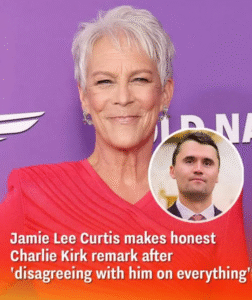Across the Divide: Jamie Lee Curtis and the Humanity Behind Disagreement
On September 15, 2025, Jamie Lee Curtis sat across from Marc Maron on his WTF podcast and did something rare in today’s polarized climate: she mourned the death of someone whose beliefs she found “abhorrent.” The person was Charlie Kirk, the conservative activist and founder of Turning Point USA, who had been fatally shot five days earlier during a speaking event at Utah Valley University. Curtis, a lifelong progressive, admitted she disagreed with Kirk “on almost every point,” yet her voice trembled with grief as she spoke of his humanity.
“I believe he was a man of faith,” she said, “and I hope in that moment when he died, that he felt connected with his faith.” Her words were not political. They were personal. And they struck a chord.
Curtis’s remarks came at a time when the nation was still reeling from the news. Kirk’s assassination had shocked both sides of the political spectrum. He was 31, a husband, a father, and a prominent figure in conservative circles. His death was not just a political loss—it was a human one. And Curtis, despite her ideological opposition, chose to honor that.
She began her reflection with a slip of the tongue, mistakenly referring to Kirk as “Charlie Crist”—a mix-up she attributed to his “deep, deep belief” in religion. The error was quickly corrected, but it underscored the emotional weight of the moment. Curtis wasn’t reading from a script. She was speaking from the heart.
“I still believe he’s a father and a husband and a man of faith,” she continued. “And I hope whatever connection to God means, that he felt it.” Her voice cracked. Tears welled. It was a moment of raw vulnerability—one that transcended politics.
Curtis then turned her attention to the broader implications of violence and media saturation. She spoke of the video circulating online that captured Kirk’s assassination, comparing it to the endless replay of 9/11 footage and the Zapruder film of JFK’s murder. “We are bombarded with imagery,” she said. “We don’t know what the longitudinal effects of seeing those towers come down over and over and over again, or watching his execution over and over and over again.”
Her concern was not just for Kirk, but for society. For the psychological toll of repeated trauma. For the erosion of empathy in a world saturated with violence. “We are inured to them and we are numb to them,” she said. “But they are in there.”
Curtis’s reflections were deeply personal. She noted that JFK was assassinated exactly five years from the day she was born. “I’m associated with this awful day of someone being assassinated on television,” she said. The connection was haunting. It added a layer of historical resonance to her grief.
What made Curtis’s remarks so powerful was their refusal to dehumanize. In an era where ideological opponents are often reduced to caricatures, she chose to see Kirk as a whole person. Not just a political figure, but a man with a family, a faith, and a life. “Even though his ideas were abhorrent to me,” she said, “I still believe he’s a father and a husband and a man of faith.”
This kind of empathy is rare. It requires emotional courage. It requires the ability to hold two truths at once: that someone’s beliefs can be deeply troubling, and that their life still matters. Curtis modeled that balance with grace.
Her remarks also sparked a broader conversation. Social media lit up with praise and criticism. Some applauded her humanity. Others questioned her sincerity. But the moment stood on its own—a testament to the possibility of compassion across divides.
Curtis wasn’t alone in her response. Celebrities like Chris Pratt, Arnold Schwarzenegger, and Jake Paul also paid tribute to Kirk. Former presidents Barack Obama and Joe Biden released statements condemning the violence. “There is no place in our country for this kind of violence,” Biden said. “It must end now. Jill and I are praying for Charlie Kirk’s family and loved ones.”
The suspect, 22-year-old Tyler Robinson, was arrested within 48 hours of the shooting. Utah Governor Spencer Cox confirmed that Robinson was refusing to cooperate with law enforcement. FBI Deputy Director Dan Bongino noted that there were “multiple warning signs” and that the agency was investigating whether the event was part of a larger effort.
But Curtis’s focus was not on the politics or the investigation. It was on the human cost. On the emotional residue left behind. On the images that linger and the empathy that fades.
Her remarks were a challenge—to herself, to her listeners, and to society. A challenge to see beyond ideology. To resist the numbing effect of violence. To remember that every life, even one we disagree with, holds value.
In the days following the podcast, Curtis remained quiet. She did not issue follow-up statements or engage in online debates. Her words spoke for themselves. They were not a performance. They were a meditation.
And perhaps that is the lesson. That in the face of tragedy, silence can be powerful. That empathy does not require agreement. That mourning does not require endorsement. That humanity, in its purest form, transcends politics.
Jamie Lee Curtis’s honest remark was not just about Charlie Kirk. It was about all of us. About the need to reclaim our shared humanity. About the courage to feel, even when it’s uncomfortable. About the possibility of grace in a graceless age.
In a world divided by belief, Curtis offered a bridge. Not a wide one. Not a perfect one. But a bridge nonetheless. And in doing so, she reminded us that disagreement does not have to mean disdain. That compassion is not weakness. That mourning is not betrayal.
It was a moment of clarity. A moment of truth. A moment worth remembering.



